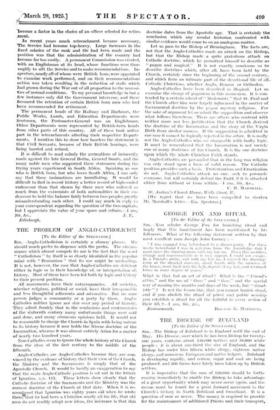THE PROBLEM OF ANGLO-CATHOLICISM [To the Editor of the SPECTATOR.]
Sit,--Anglo-Catholicism is certainly a clumsy phrase. We should much prefer to dispense with the prefix. The circum- stance which almost compels its use is the fact that the word " Catholicism " by itself is so closely identified in the popular mind with " Romanism " that its use might be misleading. It is not, however, the case that Anglo-Catholics are deficient either in logic or in their knowledge of, or interpretation of, history. Most of them have been led both by logic and history to their present position.
All movements have their extravagancies. All societies, whether religious, political or social, have their irresponsible and less thoughtful adherents and advocates. But no sane person judges a community or a party by these. Anglo- Catholics neither ignore nor slur over any period of history. They admit frankly that in the confusions and controversies of the sixteenth century many unfortunate things were said and done, and many erroneous opinions held. It would not be reasonable to charge the Church in Spain with being untrue to its history because it now holds the Nicene doctrine of the Incarnation, whereas it was almost entirely Arian for a matter of nearly two hundred years.
Non-Catholics seem to ignore the whole history of the Church from the close of the first century to the middle of the fifteenth.
Anglo-Catholics are Anglo-Catholics because they are con- vinced by the evidence of history that their view of the Church, the Ministry and the Sacraments is simply that of the Apostolic Church. It would be hardly an exaggeration to say that the main Anglo-Catholic position is set out in the letters of Ignatius, A.D. 115. These letters show dearly that the Catholic doctrine of the Sacraments and the Ministry was the current doctrine of the Church at that date. When it is re- mentcred that Ignatius was eighty years old when he wrote them7that. he bad -been a Christian nearly all his life, that old men do not readily adopt new ideas, the inference is that this doctrine dates from the Apostolic age. That is certainly the conclusion which any secular historian confronted with similar evidence would come to on an analogous matter.
Let us pass to the Bishop of Birmingham. The facts are, not that the Anglo-Catholics made an attack on the Bishop, but that the Bishop made a quite gratuitous attack on Catholic doctrine, which he permitted himself to describe as "-pagan and magical." It is not exactly courteous so to describe doctrines which, after all, have been held by the Church, certainly since the beginning of the second century, and which form an intimate part of the devotional life of all. Catholic Christians, whether Anglo, Roman, or Orthodox.
Anglo-Catholics have been described as illogical. Let us examine the charge of paganism in this connexion. It is con- tended by a certain school of " Modernists " that St. Paul and the Church after him were largely influenced in the matter of Sacramental doctrine by the pagan mystery religions. For the sake of argument let us admit the supposition and observe what follows therefrom. There are others who contend with neither more nor less justification that the Church derived the doctrine of the Incarnation and the story of the Virgin Birth from similar sources. If the supposition is admitted in one case it cannot be logically rejected in the other. It is really not the Anglo-Catholics who are chargeable with faulty logic. It must be remembered that the Incarnation is not merely one of many doctrines of the Church. It is the one doctrine upon which the whole Christian Faith stands.
Anglo-Catholics are persuaded that in the long run religion can only stand upon a basis of valid reason. The Catholic position provides such a basis. Protestantism and 14,:rastianism do not. Anglo-Catholics attack no one, seek to persuade everyone, but will certainly defend the Faith if it is attacked either from without or from within.—I am, Sir, &c.,
C. B. MARSHALL.
St. Andredo's Church house, Wells Street, W.
[We regret that we have been compelled to shorten Mr. Marshall's letter.—ED. Spectator.]














































 Previous page
Previous page